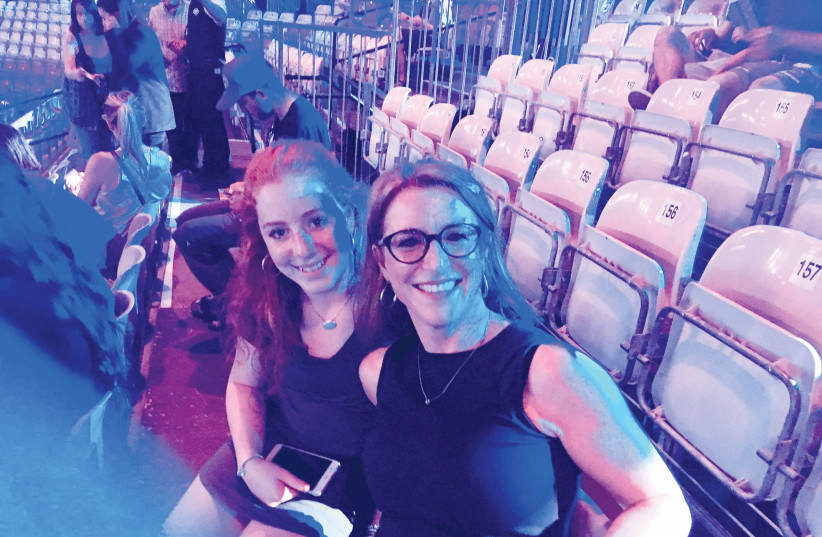The Eurovision Song Contest was a significant part of my childhood. From the moment the UK song was released, the countdown to the big night started. By the time the weekend of the contest arrived, we all knew this song by heart on account of it having been played repeatedly on every radio station in the country until we’d all grown heartily sick of it.
For me, it was a particularly exciting time as my siblings and I were allowed to stay up late to watch the whole thing, even the results. Normal bedtime rules didn’t apply!
Eurovision was more than just a song contest for me, however. Strangely enough, it was something that connected me to Israel in a subliminal sort of way when I was growing up in Manchester.
Aside from the UK entry, I’d always closely follow the Israeli song, even though back then, when I hadn’t even reached double figures, Israel was somewhat of a mystery to me – a place that held a certain fascination and meaning, although I wasn’t quite sure why; I’m not from a particularly Zionist background as you may have gathered.
That said, I felt a huge sense of pride when Israel won two years running in 1978 and 1979 with “A-Ba-Ni-Bi” and “Hallelujah” (the thought of those songs, even now, makes the hairs stand up on the back of my neck).

In the run-up to the contest, regular conversations also took place about which country we’d prefer to win – the UK or Israel. (Similar conversations also took place regarding the World Cup, although that particular competition didn’t interest me so much in those days).
Discussions surrounding the “whys and wherefores” of Israel’s participation in the contest – given that it wasn’t a European country – also dominated at that time. It is only now, as I do a little research for this article that I have the answer to this burning question. It’s simple really; Israel was able to enter as the Israel Broadcasting Authority (IBA) was an active member of the European Broadcasting Union (EBU), which is responsible for the event. All sorts of weird and wonderful theories circulated, none of which, I now know, was true. Still, they served to enhance the mystery surrounding Israel and her participation in the competition, making it all the more enjoyable for me at the time.
As the years passed and with it my interest in this singing competition, it became a relic of my youth, ignored and shunned as its glittering facade faded in my memory. This was in no small part because Israel no longer dominated on the Eurovision stage (it took another 20 years before Dana International won for Israel in 1998) and the UK’s success was almost non-existent. The fact that some amazing talent was launched there, such as ABBA and Celine Dion, was purely coincidental as far as I was concerned.
THE CONTEST was no longer a prominent feature in my calendar; a date to be missed.
Further, as Sarah Kemp, a former Brit now living in Israel wryly observed, “with the rise of Brit pop there seemed to be no impetus to take it seriously.”
This ambivalence has stayed with me throughout most of my adult life. I no longer watch the contest, making an evening of it with friends, as some do; even placing the odd bet on occasion!
These days, I do my best to avoid the competition altogether, although I was drawn in a few years ago having been offered a couple of free tickets to one of the rehearsals when the contest was being held in Tel Aviv.
Much to my surprise, we (my daughter and I) had a wonderful afternoon. The show itself was fantastic; slick, dazzling and utterly fabulous! The songs weren’t so great, but this didn’t hamper our enjoyment.
The frenzy which surrounded the event here in Tel Aviv was quite something, however. As I was to learn later, Israelis have a very special relationship with the Eurovision Song Contest.
For many here, it is more than just a song competition. Some believe that this is because of Israel’s large and active gay community, while other’s subscribe a deeper meaning to this strange phenomenon. For them, it’s an issue of national pride, optimism and cultural victory.
As Moshe Shamah, an artist and event coordinator from Jerusalem said:
“Winning Eurovision was a major cultural victory for Israel in 1978, and helped to boost morale and national pride in a country that had seen four wars, back to back, and still had (constant) existential fear. Ever since then, we have won four times, and Eurovision has become an important part of being part of the cultural fabric of the Western world for us. That, and it’s fun!”
For me, I’m sorry to say, the whole thing still leaves me cold. Maybe this is due to my predominantly British background and outlook where no one took it seriously and even the presenters, Terry Wogan and later, Graham Norton made a mockery of the whole thing, in their own inimitable way. In Britain, the contest is just a kitsch, lighthearted song contest, to be enjoyed, but not to be taken too seriously.
That said, as I’m now living in a country, Israel, where the Eurovision Song Contest has always played a more significant role in the lives of so many, I will certainly make more of an effort to embrace it alongside my newly adopted fellow countrymen.
The writer is a former lawyer from Manchester, England. She now lives in Netanya, where she spends most of her time writing and enjoying her new life in Israel.
